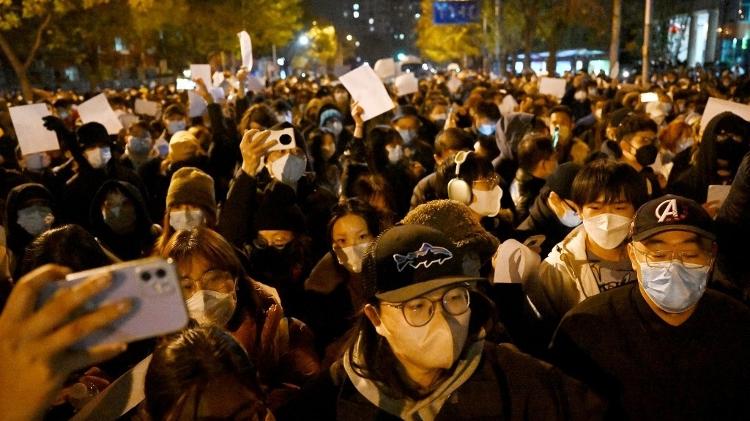China this Wednesday (7) announced a general easing of its anti-covid health rules, abandoning the restrictive strategy against the coronavirus that has created a historic wave of nationwide protests.
annoyed by the policy Zero tolerance to covid from ChinaIt provoked the largest demonstrations in the country since the 1989 pro-democracy movement, which included sudden shutdowns, large-scale testing, and quarantines, including for the uninfected.
Authorities tried to quell the protests, but at the same time they began to respond to demands, first at the local level and now at the national level.
New guidelines released this Wednesday by the National Health Commission (CNS) show that the size and scope of PCR testing (almost daily with the ‘covid zero’ policy) will be reduced.
Prisons will also be smaller, and people with cases of covid who are not considered serious or asymptomatic will be able to be isolated at home without the need to quarantine in government facilities.
In addition, citizens will not need to display a green health code on their smartphones when entering buildings and public spaces other than “rest homes, health institutions, day care centers and education centers”.
The new rules, “Large-scale PCR tests will only be done in schools, hospitals, nursing homes and workplaces that are considered high risk. The scope and frequency of PCR tests will be further reduced,” it said.
In addition, inter-provincial travelers will not need to submit a test result taken within the last 48 hours and take the exam on arrival.
China will also speed up vaccination among the elderly, which has long been considered one of the main obstacles to loosening the ‘covid zero’ policy.
speech change
At the end of last month, demonstrations against the restrictive policy of the Communist Party were observed in various parts of the country. Some people called for more political freedom and even President Xi Jinping’s resignation.
Since then, several Chinese cities have lifted some of the toughest restrictions.
Beijing, the capital, where many business establishments have reopened, announced earlier this week that citizens will not be required to submit a negative test done in the last 48 hours to access public transport.
Faced with a severe two-month lockdown this year, Shanghai has announced similar measures and will soon allow residents to enter open spaces such as parks and tourist attractions without the need for a test.
Even the state press, once dominated by grim news about the danger of the virus and the damage it has wreaked in other countries, has drastically changed its tone to downplay the risks of infection.
The dominant omicron variant “definitely does not look like the delta variant from last year,” says medical professor Chong Yutian in an article published by the Chinese Youth Daily, a newspaper affiliated with the Communist Party.
“After infection with the Omicron variant, the vast majority will have mild or no symptoms. Very few will develop serious symptoms,” he added.
Analysts at Japanese consulting firm Nomura calculated on Monday that 53 cities in China, which have a third of the national population, continue to have restrictions.
This Wednesday’s announcement comes just hours after the government released new data showing the huge economic impact of its zero-tolerance policy against covid.
China’s imports and exports fell in November and reached levels not seen since the beginning of 2020, when the pandemic paralyzed the country.
Imports fell 10.6% year-on-year in November, according to the Customs Administration. In the same period, exports fell by 8.7%.
source: Noticias
Mark Jones is a world traveler and journalist for News Rebeat. With a curious mind and a love of adventure, Mark brings a unique perspective to the latest global events and provides in-depth and thought-provoking coverage of the world at large.
